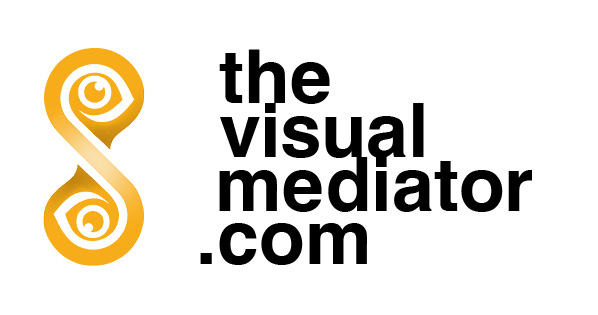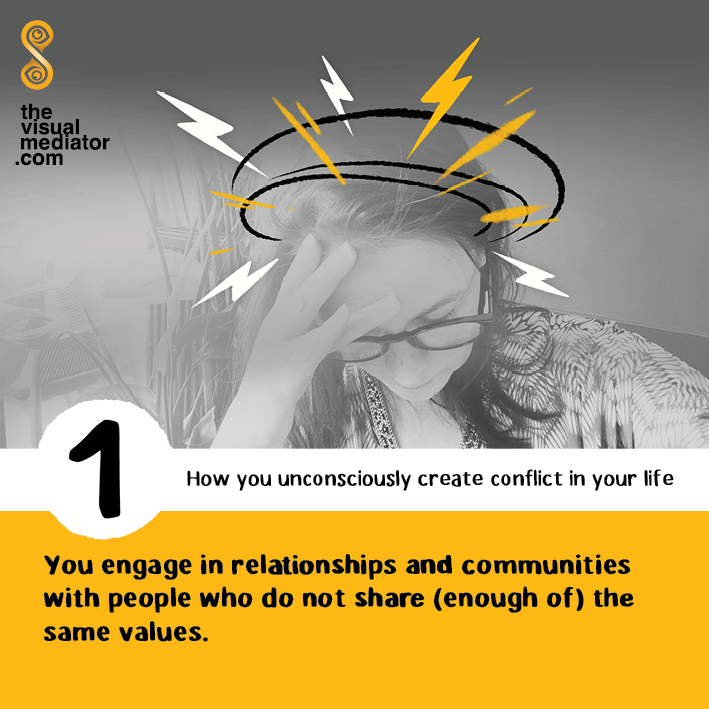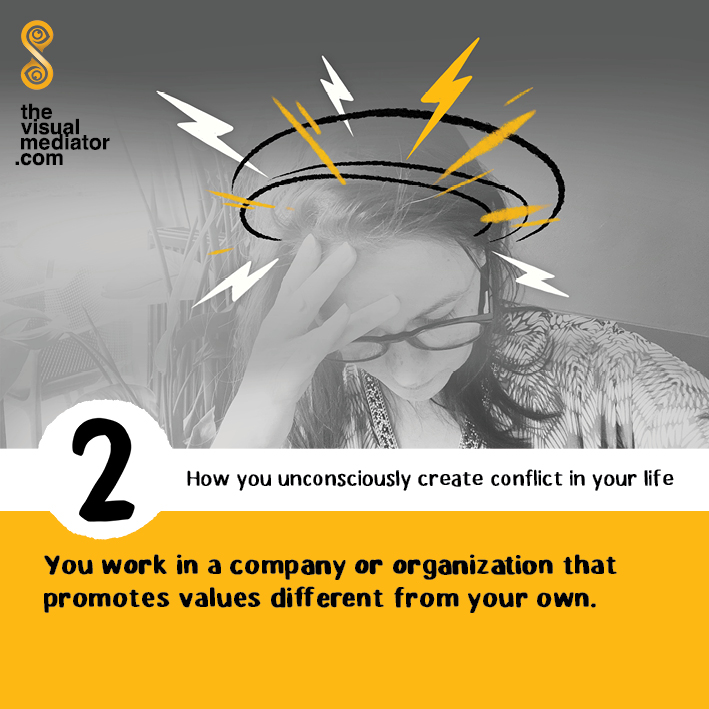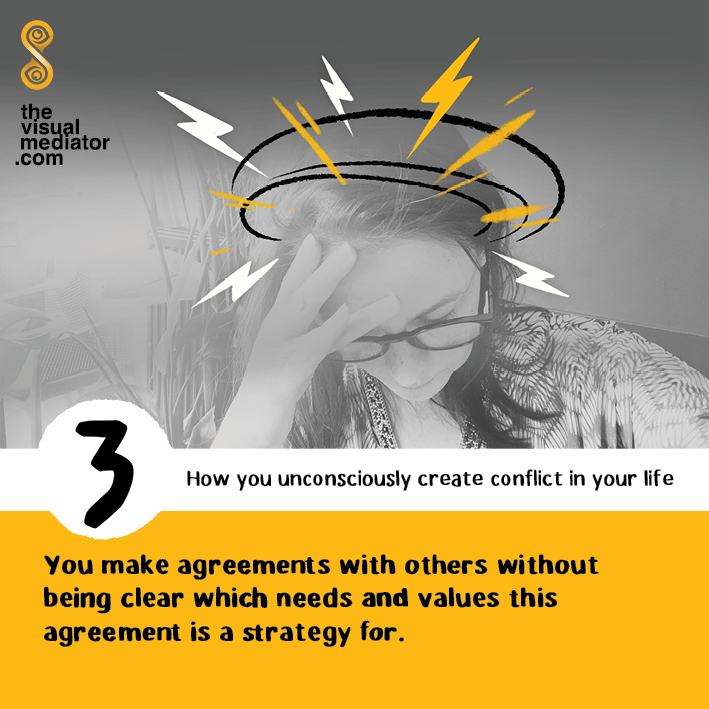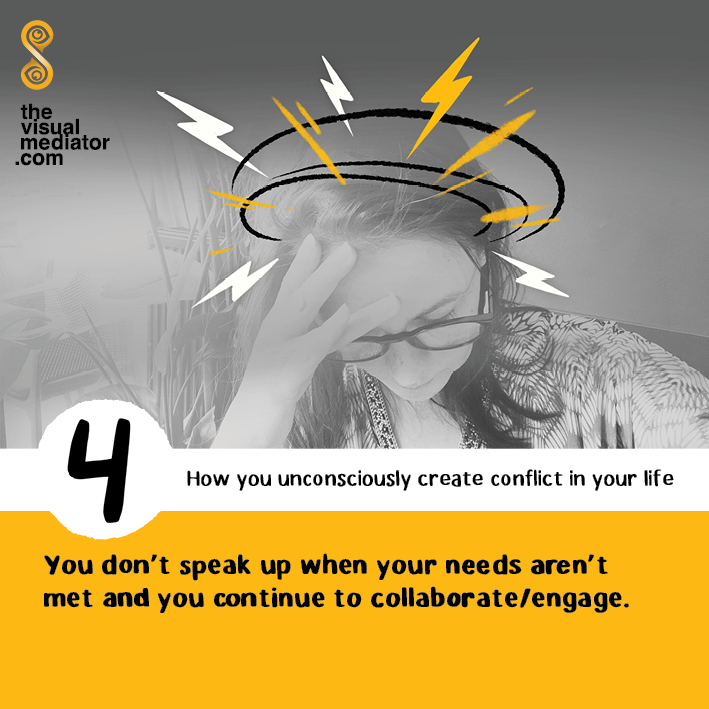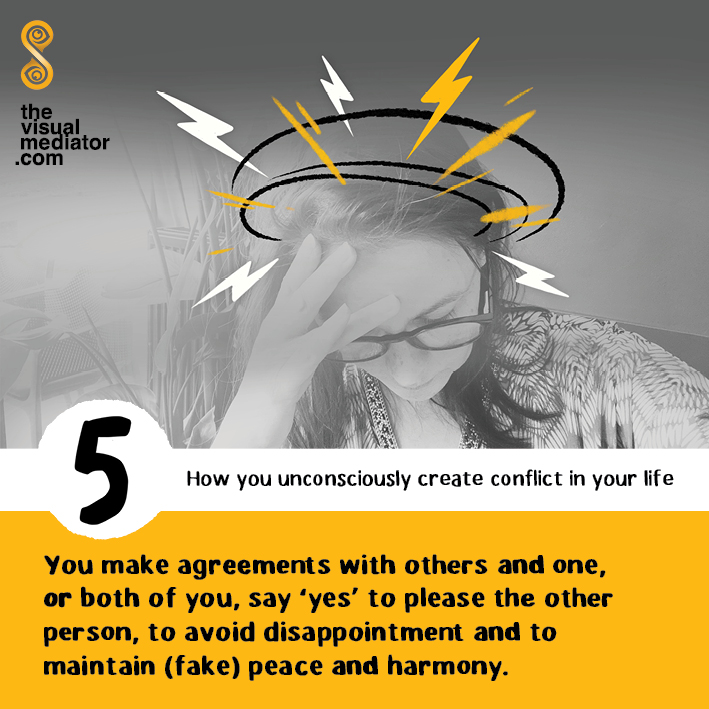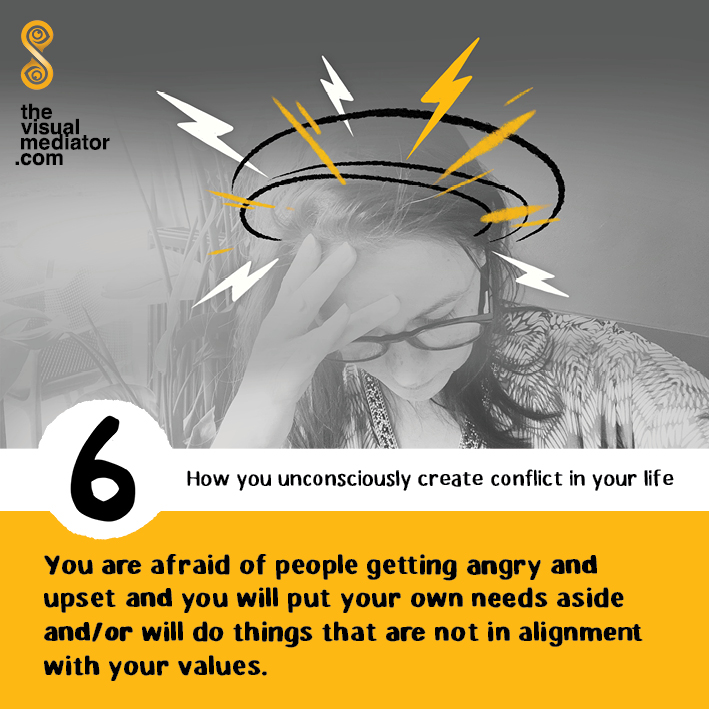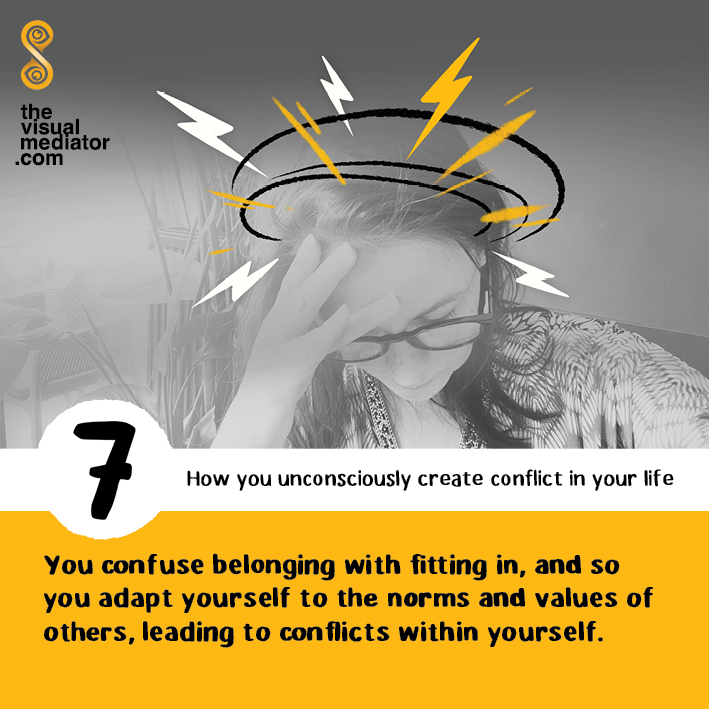Although many people would say they don’t like experiencing conflicts, I believe human beings are incredibly skilled at creating them. I also believe many people aren’t even aware of this skill, which we unconsciously developed and because we aren’t aware, keep using. Only leading to, yes, another conflict.
And even though we are frequently capable of resolving certain conflicts by ourselves, sometimes we need the help of a coach or a mediator. While working with clients, and visually capturing what their – often inner – conflicts are about, I’ve noticed several sources of conflicts. All of them cause at least inner conflict and in most circumstances, sooner or later external conflict is inevitable. There are off course more and other sources of conflict then the seven I am describing in this blog. I imagine you may identify some sources that create conflict in you inner world of in relationship to others.
SOURCE #1
You engage in relationships and communities with people who do not share (enough of) the same values.
It’s amazing how much time we spend with people who have a very different view of the world and who live by values other than our own. With an empathic and tolerant attitude, it’s not really an effort to be among people with whom we do not share the same values. However, our inner peace is significantly compromised when we don’t share the same (or enough of the same) values with people emotionally close to us or those we engage with every day. We feel tired of the constant seeking for alignment, the repetitive negotiations and the countless compromises we make – and which never really fully meet our needs. We become resentful toward the people involved and we start to question if there are ways to escape, or make decisions by ourselves because the consequences (arguments and conflicts) are just as uncomfortable as the work we put into finding synergy.
TIP >>> Next time you experience this, ask yourself if your values are different and your relationship lacks a common foundation for co-creation with ease, joy and lightness. If you are unclear about your own values and the values of the other person, the next step is to identify your values.
SOURCE #2
You work in a company or organization that promotes values different from your own.
Even when you have the opportunity to accept a job that you feel excited about, this doesn’t mean that the workplace culture is a match as well. You may feel good working there for some period of time, and when you look at your position, you might even like your job itself, but if you continue to come home feeling disappointed, restless or upset, your gut is telling you something is off. It is very likely your values are not aligned.
TIP >> Though I’d like to encourage anyone to find work in which you don’t have to betray yourself, I also like to name that I regard the ability to have that choice, as a privilege. Your family’s life circumstances, being part of a minority, or your geographical situation, can tremendously limit job opportunities and choices. This may result in accepting work that pays the bills, but may not match your education, interests, skillset or values. The degree to which you can make career choices in alignment with your values, may be limited. I can imagine writing a whole blog post on this topic, but I’d like to keep it right now to naming that becoming really good at learning to mourn and to accept limitations increases the emotional resilience needed to work in an organization you don’t belong.
SOURCE #3
You make agreements with others without being clear which needs and values this agreement is a strategy for.
Anything we do is a strategy for meeting our needs. An agreement we make with each other is also a strategy, for example, to achieve a certain result. When we end up arguing about the result – even when we agree on the fact that we achieved the agreed result – it’s often because we didn’t identify and take the needs behind the strategy in consideration when making the agreement.
TIP >> Next time you make an agreement, first ask yourself and the other person, 1) which needs and values need to be considered and 2) if the agreement and result account for them in a satisfying way.
SOURCE #4
You don’t speak up when your needs aren’t met and you continue to collaborate/engage.
There you are, collaborating with a colleague, business partner or working with a client. Things go smooth until something doesn’t work out as planned. You hope it won’t happen again and say nothing. A week later, you receive a message describing another unexpected problem and they make a request for you to fix it. You’re annoyed because you are significantly contributing more time into this project already. Your need for mutuality, reciprocity and balance aren’t met, but you say nothing. You hope this is the last time this happens. It turns out that’s not the case. You feel resentful and upset and it is just not fair to you. A conflict is about to start. But in reality, your inner conflict started the first moment you didn’t speak up.
TIP >> Next time you experience this, share with the other person what the impact for you is. Ask what the impact for the other person is. Simply talk about the needs of both of you that are not met right now and dialogue about the strategies that honor the needs of both of you.
SOURCE #5
You make agreements with others and one, or both of you, say ‘yes’ to please the other person, to avoid disappointment and to maintain (fake) peace and harmony.
Saying yes out of fear of disappointment, hurt or aggression, and a desire to keep the relationship peaceful and harmonious, starts with good intent, but is putting you and everyone involved, at such a risk of experiencing exactly that what you are avoiding. In most cases you experience inner conflict, because you have to betray your own values, or give up on your own needs, to keep the peace. Fake external peace, of course, because meanwhile you have a little war going on within yourself.
TIP >> Next time you are about to say a half-hearted yes, let the person know to which part of their request you are saying no:
1) to the timing > agree upon a time that meets both your, as their needs.
2) to the place > agree upon a place that meets both your, as their needs.
3) to the strategy > agree upon a strategy that meets both your, as their needs.
4) to the request involving you > if for whichever reason you do not see yourself involved in the strategy or even in contributing to the needs of the other person, you can simply say no. If you care about them and are happy to take a moment, you can also choose to help them find another person who is available and happy to follow up on the request.
SOURCE #6
You are afraid of people getting angry and upset and you will put your own needs aside and/or will do things that are not in alignment with your values.
Being at the receiving end of an emotional outburst can be a terrifying experience. It’s understandable that one would like to avoid such an experience, which even after it’s over, it takes time for the impact to dissipate. Sometimes the impact is so great that we need to adapt our schedule because we may need support to deal with the emotional impact or we are too upset to concentrate on the work we planned to do. Isn’t it totally understandable that we want to avoid this? An easy way is to put our own needs and values aside when we do not agree to what the other person wants or proposes us to agree to. Although this kind of keeps the peace in the relationship, it does not keep the peace within ourselves because this strategy requires us to betray ourselves.
TIP >> Next time someone makes a request of you, and saying yes would mean putting your own needs and values aside, choose another route. The route I am proposing is to honestly share which needs of ours aren’t met by their proposal, or which values of yours are not translated into it. The specific elements to consider are the same as shared in my proposal in section 5.
SOURCE #7
You confuse belonging with fitting in, and so you adapt yourself to the norms and values of others, leading to conflicts within yourself.
Though most of us have a sense that they belong to the family in which they grew up, or to the community they are part of, it’s not uncommon for people to adapt themselves to experience that sense of belonging. The values we are raised with, may not be the values we actually value ourselves. To continue to have that sense of belonging, we must live, at least enough, by the values and norms of the group. This is not belonging. This is betraying yourself in order to fit it. Betraying yourself always leads to inner conflict. Brené Brown speaks to this very powerfully in this video.
TIP >> Unlike with some of the above-mentioned strategies, this situation doesn’t have a quick fix. To change this dynamic, you’ll need to be first all really clear about your values, needs and norms and the ones of your family, community, or even the partnership you are in. Based on your findings, you’ll likely need to make decisions as to which degree you are going to stop betraying yourself or live, at times, with compromises. The consequences of these decisions may be very impactful and perhaps require you to get support from someone to guide you in this painful, yet liberating process.
Do you see how valuable it is in your conflict management that you are clear about your values and needs? I am curious to hear in which of these ways you create conflict in your life and if you are clear what your values are.
If you would like to have help identifying your values, I invite you to join the Core Values workshop I am co-facilitating with Eleftheria Kakambouras in Ljubljana on April 20st, 2024.
If you’d love to join but can’t make the date or would rather participate online, would you please reach out to me?
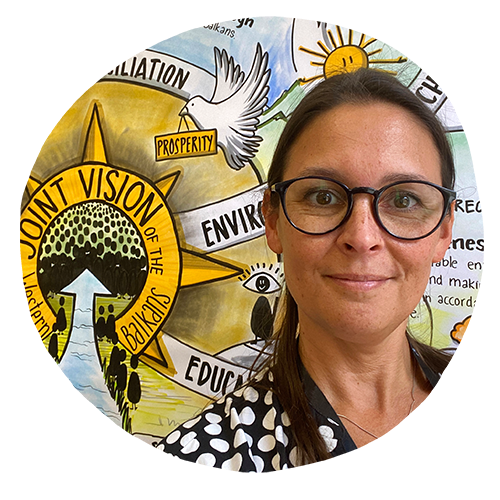
My name is MIREILLE VAN BREMEN
I value transparency, equality, fairness, peace and wellbeing, and I believe peaceful relationships are the result of how capable we are in listening and valuing each other's contribution in co-creating the future. This is why I create, design and offer products and programs that help us develop and use our visual and emotional intelligence to promote these values.
The foundation of my work is formed by two studies at the Willem de Kooning Academy of Art in Rotterdam, The Netherlands, and years of experience in the fields of graphic design, illustration, graphic recording, visual facilitation training and Nonviolent Communication based coaching, training, and conflict resolution.
I work as a bridge between complex ideas and audiences, using visual tools to clarify, present, and interpret information. Through graphic recording of discussions and visual facilitation of processes, I support getting all stakeholders to speak one voice, making it possible to create a joint vision of the future that all stakeholders are committed to.
